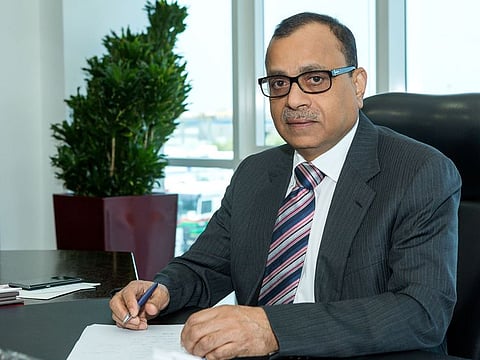Business for purpose
In conversation with Eugene Mayne, Group CEO, Tristar Group

Highlight
Eugene Mayne, Group CEO, Tristar Group, talks about how the post-pandemic world will see constant innovation and his vision to be a top class company
What part does Tristar play in the region’s logistics sector?
Tristar began operations in 1998 distributing fuels for international and national oil majors operating in the UAE, to address the lack of professional transporters for bulk petroleum products that were safe and reliable.
Today, we have set global standards for safe road transport and have expanded to 21 countries on three continents across the energy value chain. In parallel we are also a ‘Business for Purpose’; we place great emphasis on driving strong environmental, social and governance culture across the company to ensure that we continue to build and operate our business responsibly.
Being a market leader, it is important for us to set the standards and we continue to do this by employing industry best practices and staying abreast with global standards in the logistics sector while further expanding our footprint in the GCC and globally.
What are Tristar’s key technology and services?
Our services include road and maritime transportation of fuels, specialised warehousing, fuel farms management, into plane refueling, remote fuel supply operations, chemicals and lubricants distribution, and most recently cryogenic liquids transport services within the GCC. Currently, we are evaluating Robot Processing Automation, Artificial Intelligence and smart ship solutions to lend a competitive edge. We have also acquired new trucks with the latest active and passive safety technology, which will enhance our road safety practices.
What are the main challenges facing logistics in the Middle East/GCC right now?
There is no room for complacency and the survivors will be those who are able to adopt and manage the changes that our industry is going through. The Middle East logistics industry is facing economic challenges and the focus is on reducing costs without disrupting service levels. Due to the uncertainties surrounding the pandemic, logistics companies need to adapt from a ‘just in time, to a just in case model’. Another challenge is the need to reassess current operating models with digital solutions to optimise processes. Restriction of movement and work from home practices will place greater emphasis on the impact of mobility on the environment.
In the same way, logistics companies will need to reinvent themselves as sustainable mobility options, such as electric vehicles and green energy, will gather momentum and will drive policy going forward.
What is Tristar’s customer approach looking into the future?
We will have to take stock of the impact of the pandemic on our customer relationships and drive changes as needed in order to keep up with their needs. I believe we cannot continue to operate as we did before Covid-19 and we must recalibrate our products and service levels to emerge stronger than before if we want to continue to maintain our leadership position in the industry.
Our success going forward will be defined by our stakeholder relationships and therefore we will need to continue to build on our ecosystem of winning new customers with new products and services and for this we will need to be ready to compete based on speed of action and decision making.
What do you think the future holds for the warehousing and logistics industry?
The post-pandemic world will see constant innovation and roll out of new products and services. Technologies that would have taken years to adopt are now being implemented in a matter of months. Smart ship, Blockchain, internet of things and robot process automation will enable transparency, flexibility and remote oversight, which will be essential in the future.
There will be an accelerated shift towards renewable energy sources as climate change moves up the agenda for local and regional governments. Sustainability will be a key priority going forward and is already an integral part of our business.
Tristar is committed to supporting the Paris Climate Agreement and we are already exploring initiatives that include maximising the use of renewable energy across group operations. We are also looking into hybrid wave technology which will reduce greenhouse gas emissions.
What is your vision and what are the strategic priorities for Tristar moving forward?
Our vision is to be a world-class company. This means that in addition to operating as a successful business with global operations, we also aim to be a ‘Business for Purpose’ by caring for the environment and the communities where we operate.
For the short-term, we will focus on strengthening our integrated logistics model by looking for key acquisitions in our areas of interest and ensuring that our organic business continues to grow annually in double digits.
In spite of the pandemic, our performance this year is a testimony to the resilience of our business model built on long-term contracts. We will continue to develop and grow this model — a strategy which has worked well for us over the last 20 years.



